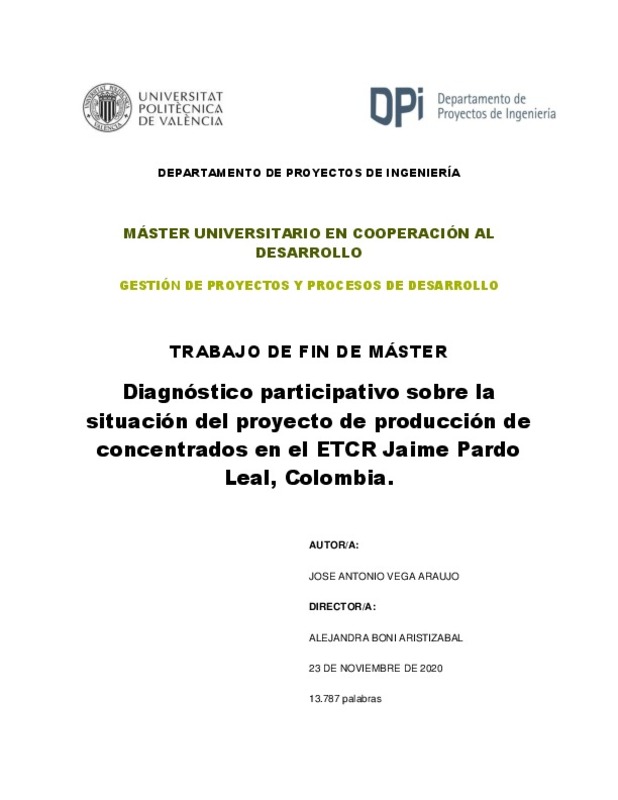|
Resumen:
|
[ES] El Espacio Territorial de Capacitación y Reincorporación (ETCR) Jaime Pardo Leal, ubicado en la vereda Colinas del municipio de San José del Guaviare, Colombia, nace en el marco de los acuerdos de Paz de La Habana, ...[+]
[ES] El Espacio Territorial de Capacitación y Reincorporación (ETCR) Jaime Pardo Leal, ubicado en la vereda Colinas del municipio de San José del Guaviare, Colombia, nace en el marco de los acuerdos de Paz de La Habana, Cuba, como una estrategia integral para la reincorporación a la vida civil de aproximadamente 380 exguerrilleros/as de las FARC-EP . En sus casi 3 años de conformación es un ejemplo claro de organización territorial que trabaja por llegar a ser referente de paz en el sector rural del municipio de San José del Guaviare, lo cual va íntimamente vinculado con la puesta en marcha de procesos de reincorporación económica y social de los exguerrilleros/as.
Desde el Observatorio de Diseño e Innovación Social de la Universidad Nacional de Colombia se ha venido desarrollando el acompañamiento a diferentes iniciativas dentro del ETCR con el ánimo de realizar aportes desde el co-diseño a la identificación de problemáticas y construcción de alternativas desde el territorio en una perspectiva solidaria, sostenible, incluyente y alternativa a los modelos de desarrollo centrados en los mercados.
Una de las iniciativas apoyadas desde el Observatorio está basada en el eje temático de agroecología donde confluyen 4 proyectos complementarios: piscicultura, porcicultura, cultivos agroecológicos y generación de concentrados artesanales. Todos establecidos dentro de un sistema de mutuo beneficio y acogidos por un interés hacía el autoabastecimiento y la autogestión. Las tareas del Observatorio buscan difundir esta experiencia agroecológica en un ejercicio de trabajo colectivo y de diálogo de saberes con el objetivo de defender la relación de mutuo beneficio entre la naturaleza y el ser humano.
En ese sentido, se propuso realizar un diagnóstico participativo del proyecto de generación de concentrados, siendo el punto neurálgico del sistema y base para el sostenimiento de la alimentación de los animales que a su vez fortalece el abastecimiento alimenticio de la población del ETCR. Se entiende al proceso de diagnóstico como una oportunidad para identificar problemáticas y oportunidades de intervención, además de crear conocimiento colectivo que permita la continuidad y trazabilidad del proyecto a través de la consolidación de información.
[-]
[EN] The Territorial Space for Training and Reincorporation (ETCR) Jaime Pardo Leal is located in the village Colinas within the municipality of San José del Guaviare, Colombia. It was born within the framework of the Peace ...[+]
[EN] The Territorial Space for Training and Reincorporation (ETCR) Jaime Pardo Leal is located in the village Colinas within the municipality of San José del Guaviare, Colombia. It was born within the framework of the Peace Agreements of Havana, Cuba, as a comprehensive strategy for the reincorporation to civil life of approximately 380 ex-guerrillas of the Revolutionary Armed Forces of Colombia - People's Army (FARC- EP). In its almost 3 years of conformation, it is a clear example of a territorial organization that works to become a benchmark for peace in the rural sector of the municipality of San José del Guaviare, this fact is closely linked with the implementation of economic and social reincorporation processes of the ex- guerrillas.
The Observatory of Design and Social Innovation of the National University of Colombia has been developing support for different initiatives within the ETCR. With the aim of making contributions using co- design to the identification of problems and construction of alternatives from the territory in a solidary, sustainable, inclusive and alternative perspective to development models focused on markets.
One of the initiatives supported by the Observatory is based on the thematic axis of agroecology where 4 complementary projects converge: fish farming, pig farming, agro-ecological crops and generation of artisan concentrates. All those are established within a system of mutual benefit and driven by an interest in self-sufficiency and self-management. The tasks of the Observatory seek to disseminate this agroecological experience in an exercise of collective work and dialogue of knowledge with the aim of defending the relationship of mutual benefit between nature and human beings.
In this sense, it was proposed to carry out a participatory diagnosis of the concentrate generation project for being the cornerstone of the system. It is also the basis for sustaining the animals, which in turn strengthens the food supply of the ETCR population. The diagnostic process is understood as an opportunity to identify problems and opportunities for intervention, in addition to creating collective knowledge that allows the continuity and traceability of the project through the consolidation of information.
[-]
|







